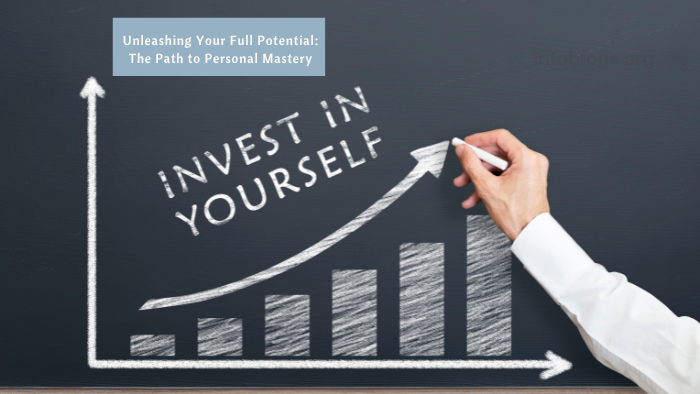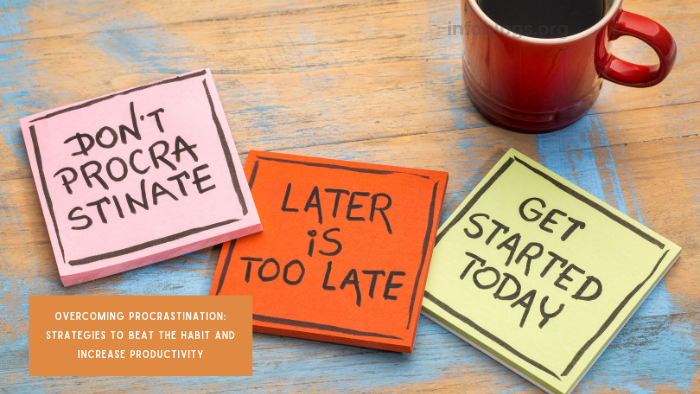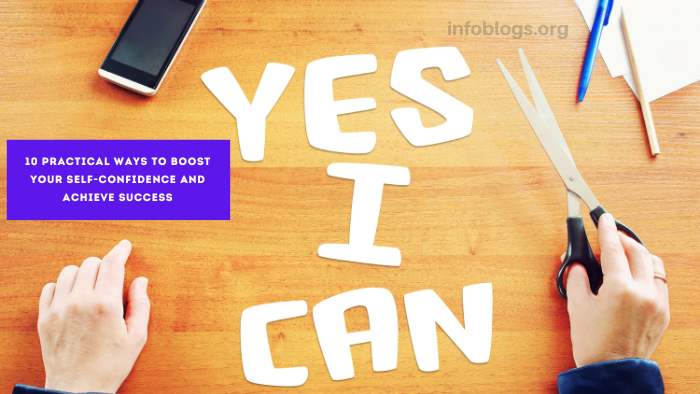
Jul 18, 2023 | Personal Development
Personal mastery is a lifelong journey of self-discovery, continuous learning, and unlocking our hidden talents, strengths, and capabilities. It is through this process that we can unleash our immense untapped potential and achieve personal growth, fulfillment, and extraordinary achievements. In this article, we will delve into the path of personal mastery and explore how it can help us create a purposeful and successful life.
Embrace Self-Awareness
Developing self-awareness is the initial stage in achieving personal mastery. Dedicate some time to introspection and assess your strengths, weaknesses, values, passions, and aspirations. Comprehend the factors that motivate you, bring you happiness, and recognize the aspects that require growth. By being self-aware, you can discover your genuine capabilities and ensure that your decisions and behaviors align with your authentic self.
Set Clear and Ambitious Goals
Personal mastery can be achieved by establishing clear and ambitious goals. Goals serve as a compass, helping to concentrate and inspire efforts towards personal growth and excellence. It is important to divide long-term objectives into smaller, attainable milestones. Make sure that your goals are specific, measurable, achievable, relevant, and time-bound (SMART). By setting challenging goals, you challenge yourself beyond your comfort zone and tap into untapped capabilities.
Cultivate a Growth Mindset
Personal mastery requires adopting a growth mindset. This means accepting that your skills and intellect can be enhanced through hard work, commitment, and a willingness to gain knowledge from mistakes. Rather than avoiding challenges, see them as chances for personal development. Instead of being discouraged by setbacks, consider them as valuable lessons. And most importantly, remain determined even when faced with obstacles. By having a growth mindset, you allow yourself to constantly improve and discover limitless possibilities.
Invest in Continuous Learning
Achieving personal mastery necessitates a dedication to continuous learning throughout one's life. It is important to actively pursue knowledge, skills, and experiences that broaden your perspectives and enhance your self-awareness. Engage in reading, attend seminars, enroll in courses, and surround yourself with individuals who motivate and push you to grow. Embrace different viewpoints, acquire fresh skills, and maintain flexibility in an ever-evolving world.
Develop Resilience
The journey towards personal mastery requires the essential quality of resilience. In life, there are numerous highs and lows, and encountering obstacles is unavoidable. Nevertheless, it is your reaction to adversity that ultimately shapes your advancement. Foster resilience by nurturing a positive outlook, prioritizing self-care, and establishing a network of support. Embrace challenges as chances for personal growth, extract valuable lessons from failures, and emerge even stronger.
Take Action and Embrace Accountability
Achieving personal mastery necessitates consistently taking action and embracing responsibility for your growth. Leave behind any excuses and take ownership of your choices and actions. Divide your objectives into manageable steps, devise a plan, and commit to daily, deliberate efforts towards your personal development. Embrace accountability by actively seeking feedback, monitoring your progress, and adapting your approach as needed.
Practice Self-Reflection and Mindfulness
Personal mastery can be achieved through the powerful practices of self-reflection and mindfulness. It is important to allocate some time each day for pausing, reflecting on experiences, and nurturing mindfulness. Activities like meditation, journaling, or deep introspection can be helpful in this process. By being fully present in the present moment and gaining a clear understanding of our thoughts, emotions, and intentions, we can make conscious decisions that are in harmony with our true potential.
Conclusion
The journey towards personal mastery is a transformative one that allows you to unleash your full potential. By embracing self-awareness, setting ambitious goals, cultivating a growth mindset, investing in continuous learning, developing resilience, taking action, and practicing self-reflection, you have the power to unlock the greatness within you. It's important to remember that personal mastery is not a destination but an ongoing process. So, embrace the journey, celebrate your progress, and live a life that reflects your true potential.

Jul 6, 2023 | Personal Development
In the modern world, it has become more difficult to maintain mental clarity and sharp focus due to the fast-paced nature of life. With many distractions competing for our attention, it is crucial to develop methods that can improve our focus and concentration. Luckily, there are effective strategies that can enhance mental clarity and unlock our cognitive abilities. This article will discuss valuable techniques for boosting mental clarity and achieving better focus and concentration.
Prioritize Mindful Meditation:
Mindful meditation is a highly effective technique for enhancing focus and concentration. Engaging in regular meditation allows you to quiet your mind, alleviate stress, and enhance cognitive functioning. To begin, locate a calm and comfortable environment where you can either sit or lie down. Close your eyes, take deep breaths, and concentrate on the sensation of your breath flowing in and out of your body. Whenever your thoughts wander, gently redirect your attention back to your breath. Initiate with just a few minutes each day and gradually extend the duration as time progresses. By consistently practicing meditation, you can enhance your capacity to remain present and attentive throughout the entirety of your day.
Regular practice of mindful meditation has been scientifically validated to augment the thickness of the prefrontal cortex, which is accountable for executive functions like attention and concentration. By incorporating consistent meditation into your routine, you can amplify mental clarity and fortify your capacity to concentrate.
Practice Mindfulness in Daily Activities:
To enhance mental clarity, it is important to incorporate mindfulness into your daily routine in addition to practicing meditation. Mindfulness entails being fully engaged in the present moment, without judgment, and paying attention to your thoughts, feelings, and sensations. Whether you are eating, walking, or working, give your undivided attention to the task at hand and avoid multitasking. By immersing yourself completely in each activity, you can train your mind to be more focused and attentive.
Numerous studies have demonstrated that integrating mindfulness into daily activities enhances working memory and cognitive flexibility. By being fully present in the moment, you can reduce mental clutter and improve your ability to concentrate on the current task.
Optimize Your Environment:
Improving focus and concentration can be achieved by acknowledging the influence of your physical surroundings. To enhance mental clarity, it is crucial to create a conducive environment that minimizes distractions. Ensuring cleanliness and organization in your workspace eliminates any clutter that may divert your attention. If feasible, choose a tranquil location for work to minimize interruptions and noise. Moreover, the lighting in your surroundings should be considered; natural light can be revitalizing, whereas harsh artificial lighting may induce fatigue and hinder concentration. By optimizing your environment, you are paving the way for heightened mental clarity.
Break Tasks into Smaller, Manageable Units:
Improving focus and concentration can be challenging when faced with overwhelming tasks. However, by breaking down larger tasks into smaller, more manageable units, you can effectively combat this issue. This strategy enables you to concentrate on one task at a time, preventing your mind from being overwhelmed. As you successfully complete each smaller task, you will gain a sense of progress and build momentum, which in turn motivates you to keep going. Known as “chunking,” this technique not only helps maintain mental clarity but also allows you to direct your attention effectively and avoid cognitive overload. By dividing complex tasks into smaller chunks, you can reduce the cognitive load, making it easier to maintain focus and concentration.
Take Regular Breaks:
To enhance your focus and concentration, it is important to avoid mental exhaustion and reduced attention by taking breaks regularly. These intervals will restore your mental energy and ensure clarity of thought. Engage in activities that promote relaxation and rejuvenation, like going for a walk, practicing deep breathing exercises, or simply resting your eyes for a few moments. By allowing your mind to rest periodically, you will be able to approach your tasks with renewed focus and concentration.
To enhance focus and concentration, studies have demonstrated that incorporating brief intervals of rest during extended work periods can be highly beneficial. These intervals provide an opportunity for your brain to rejuvenate and prevent mental fatigue. A recommended approach is to schedule short breaks, such as a five-minute pause every hour or a more extended break every few hours. Utilize this time to partake in activities that promote relaxation and mental recharging, such as stretching, listening to music, or engaging in a hobby.
Conclusion:
In today's fast-paced world, it is crucial to develop the essential abilities of enhancing mental clarity and improving focus and concentration. By integrating mindful meditation, incorporating mindfulness into your daily activities, optimizing your surroundings, dividing tasks into smaller segments, and taking regular breaks, you can amplify your mental clarity and tap into your cognitive capabilities. By consistently practicing these methods, you will gain the confidence to confront the demands of the modern world with heightened focus, concentration, and a clear mind. This will ultimately result in heightened productivity and an overall sense of well-being.
To enhance your focus and concentration, it is essential to have patience and commitment in developing these techniques. Begin with small steps and gradually increase your practice as time goes on. With perseverance, you will witness enhancements in your mental clarity, focus, and concentration. Embrace these techniques as lifelong habits and keep exploring other strategies that align with you. By giving priority to mental clarity, you can unleash your complete potential and attain success in different areas of your life.

Jul 5, 2023 | Personal Development
Positive affirmations, which are simple yet profound statements of self-empowerment and encouragement, have become a powerful tool for personal growth and transformation in our fast-paced and demanding world. It is crucial to cultivate a positive mindset and nurture our inner selves in order to thrive. By consciously and consistently integrating positive affirmations into our daily lives, we can harness their incredible power to reshape our thoughts, beliefs, and ultimately, our reality. This article will delve into the concept of positive affirmations, explore their advantages, and provide practical methods for incorporating them into our lives.
Understanding Positive Affirmations:
Positive affirmations are statements that embody our aspirations, principles, and objectives. They serve the purpose of countering pessimistic thoughts and convictions by instilling empowering and productive ones. Through consistent repetition of these affirmations, we can reshape our subconscious mind and harmonize our thoughts and behaviors with our genuine capabilities.
The Science behind Positive Affirmations:
Positive affirmations have been the subject of scientific research, which has revealed their effectiveness. Research indicates that affirmations can change our negative self-perceptions, boost our self-esteem, and alleviate stress and anxiety. By repeatedly reciting positive statements, we trigger the reward centers in our brain and encourage the release of positive neurochemicals like dopamine and serotonin. This mechanism strengthens our self-belief and improves our overall state of being.
Crafting Powerful Affirmations:
For positive affirmations to be effective, it is crucial to create ones that personally resonate with us. To craft powerful affirmations, consider the following tips:
a) Use the present tense to reinforce the idea that they are already true and reflect your current reality.
b) Keep them positive by focusing on what you want to achieve or experience, rather than what you want to avoid or eliminate. Frame your affirmations in a positive light.
c) Be specific about the outcome you desire to bring focus and intention to your affirmations.
d) Enhance their impact by infusing emotions into your affirmations and visualizing yourself already experiencing the desired outcome.
Integrating Affirmations into Daily Life:
The effectiveness of positive affirmations can be enhanced and their consistent practice ensured by incorporating them into your daily routine. Here are a few ways to integrate these affirmations into your life:
a) Start your day by repeating affirmations that align with your goals and intentions as part of your morning rituals. This will set a positive tone for the day ahead.
b) Utilize sticky notes and visual cues by placing affirmations in visible areas like your bathroom mirror, desk, or car dashboard. These reminders will serve as powerful visual cues throughout the day.
c) Deepen the connection to your affirmations and reinforce their positive impact by writing them down in a journal, along with any related thoughts, reflections, or experiences.
d) Positive affirmations or guided meditation audios: Make use of pre-recorded audios containing affirmations or guided meditations to assist you in achieving relaxation, concentration, and internalizing positive statements.
The Ripple Effect of Positive Affirmations:
By regularly engaging in positive affirmations, you will observe a transformation in your mindset and behavior. Your self-confidence, ability to bounce back from setbacks, and hopeful outlook will strengthen. This optimistic aura will permeate every aspect of your existence, enhancing your connections with others, stimulating your imagination, and enabling you to conquer obstacles and welcome new possibilities.
Conclusion:
Positive affirmations have the ability to bring about profound changes in our lives by empowering us to develop a positive mindset and access our untapped potential. By deliberately replacing limiting beliefs with empowering thoughts, we have the ability to shape our own reality and manifest a life that is abundant in happiness, success, and fulfillment. Embrace the strength of positive affirmations, make them a consistent practice, and witness as they open doors to a future that is brighter and more satisfying. Always remember that you possess the power within yourself to create the life you genuinely aspire to – begin affirming it today!

Jul 3, 2023 | Personal Development
The power of gratitude is often overlooked in a fast-paced and challenging world. However, it has the ability to transform our lives and bring genuine happiness. Cultivating appreciation not only changes our perspective but also has numerous benefits for our mental, emotional, and physical well-being. This article will delve into the transformative effects of gratitude and its positive impact on our lives.
The Essence of Gratitude
The power of gratitude extends beyond mere words of thanks or showing appreciation for what we receive. It encompasses a deep-rooted perspective and a deliberate decision to center our attention on the blessings and positives in our lives, irrespective of the situation. By practicing gratitude, we redirect our focus from what we lack to what we already possess, nurturing a sense of contentment and satisfaction.
Benefits of Gratitude
Increased Happiness: The power of gratitude has been scientifically proven to enhance levels of happiness. When we recognize and value the positives in our lives, we stimulate positive emotions and establish a feeling of contentment. This enables us to fully enjoy the present and discover delight in life's simplest pleasures.
Improved Mental Health: The power of gratitude has been demonstrated in its ability to alleviate symptoms of depression, anxiety, and stress. It fosters a positive perspective and enables us to cultivate resilience when confronted with difficulties. Those who are grateful often possess enhanced self-esteem and a stronger sense of purpose in their lives.
Enhanced Relationships: The power of gratitude lies in its ability to enhance social connections and strengthen relationships. By appreciating and expressing gratitude towards others, we foster a sense of belonging and deepen our bonds. Additionally, gratitude has the potential to enhance communication and empathy, ultimately resulting in healthier and more fulfilling connections.
Better Physical Health: The power of gratitude is linked to various positive effects on physical health. Studies indicate that individuals who are grateful tend to have better sleep, lower blood pressure, and a stronger immune system. Gratitude contributes to overall well-being by reducing stress and fostering positive emotions.
Cultivating Gratitude
Gratitude Journaling: The power of gratitude can be harnessed by maintaining a gratitude journal, where you jot down a few things you appreciate each day. This habit redirects your attention to the positives and strengthens an attitude of thankfulness.
Expressing Gratitude: Recognize the power of gratitude by dedicating some time to show appreciation towards others. Whether it's through a sincere thank-you note or expressing your heartfelt appreciation directly, small gestures can have a profound impact. Authentic acts of gratitude not only uplift those around you but also foster a deep sense of fulfillment within yourself.
Mindful Appreciation: Tap into the power of gratitude by actively participating in mindfulness practices that prompt you to embrace the present moment and express appreciation for your environment. Take time to observe the splendor of nature, relish a delectable meal, or acknowledge the little moments of happiness that occur in your daily existence.
Perspective Shift: The power of gratitude lies in consciously choosing to shift your perspective towards it whenever you encounter challenges or setbacks. Rather than dwelling on what went wrong, direct your attention towards the lessons learned or the strengths gained from the experience. By embracing gratitude, you can harness its strength as a tool for resilience and personal growth.
Conclusion
The power of gratitude is truly remarkable as it has the ability to completely change our lives, enabling us to experience genuine happiness and a sense of fulfillment. When we intentionally foster an attitude of appreciation, we are able to redirect our attention from what we are lacking towards the abundance that is present in our lives. The positive effects of gratitude go beyond our personal well-being, as they also have a significant impact on our relationships, mental well-being, and physical vitality. If we embrace the power of gratitude, we will witness the profound transformation it can bring to our lives. So why not start today and allow gratitude to guide us towards a happier and more fulfilling existence ?

Jun 24, 2023 | Personal Development
Many people struggle with procrastination, which can impede progress towards achieving goals and lead to increased stress and a cycle of unfinished tasks. However, there are effective strategies and a positive mindset that can help overcome this habit. This article will delve into ways to conquer procrastination and boost productivity.
Understand the Root Causes:
Overcoming procrastination requires acknowledging the underlying causes that lead to delaying tasks. Examining factors like fear of failure, perfectionism, feeling overwhelmed, or lacking clarity can help identify the root causes. Once identified, you can tackle them head-on and find effective solutions.
Break Tasks into Manageable Chunks:
Overcoming procrastination can be achieved by breaking down overwhelming tasks into smaller, manageable chunks. This approach makes the tasks less daunting and easier to tackle. It's important to focus on one task at a time and celebrate each small step completed.
Set Clear and Specific Goals:
To overcome procrastination, it is important to establish distinct and measurable objectives that serve as a guide for action. These goals should be defined in a precise, quantifiable, and time-sensitive manner. Having a well-defined objective makes it simpler to maintain concentration and stay motivated while working.
Prioritize and Plan:
To overcome procrastination, it is important to develop a prioritized to-do list that clearly outlines your tasks and their respective deadlines. To effectively prioritize your tasks, consider their level of importance and urgency. Additionally, breaking down your day into focused blocks of time dedicated to specific tasks can help you stay on track and avoid distractions. By planning your day in advance, you can ensure that you allocate sufficient time to complete essential tasks and stay organized.
Utilize Time Management Techniques:
To overcome procrastination, try out various time management methods like the Pomodoro Technique or time blocking that require working in focused intervals and taking brief breaks to sustain concentration and prevent exhaustion. These approaches can help enhance productivity and concentration.
Eliminate Distractions:
To overcome procrastination, it is important to recognize and reduce any distractions that may hinder your productivity. This can be achieved by disabling notifications on your phone, shutting down any irrelevant tabs on your computer, and establishing a specific workspace that is free from disturbances. Additionally, you may consider utilizing website blockers or productivity applications to restrict access to any distracting websites or applications.
Practice Mindfulness and Self-Awareness:
In order to overcome procrastination, it is important to cultivate mindfulness and self-awareness. This involves recognizing the patterns of thoughts and behaviors that lead to procrastination and redirecting your focus back to the task at hand when you catch yourself procrastinating. Mindfulness techniques like deep breathing and meditation can be helpful in developing awareness and focus.
Break the Perfectionism Trap:
Procrastination can be overcome by letting go of perfectionism. Instead, focus on completing tasks rather than making them perfect. Recognize that making mistakes and having imperfections is a natural part of the learning process. Allow yourself to make progress and gain knowledge from your experiences. By adopting a growth mindset, you can conquer the fear of not meeting unattainable expectations and move forward with confidence.
Find an Accountability Partner:
To overcome procrastination, seek the assistance of an accountability partner and confide in them about your objectives and timelines. Request them to hold you responsible, and schedule regular check-ins and progress reports to stay motivated and accountable.
Celebrate Progress and Practice Self-Compassion:
It is important to acknowledge and appreciate any progress made in overcoming procrastination, even if it seems insignificant. Recognize the efforts and accomplishments made along the way and practice self-compassion when facing obstacles. It is crucial to remember that overcoming procrastination is a process, and every step taken towards it is significant.
Conclusion:
To conquer procrastination, one must possess self-awareness, efficient planning, and a proactive attitude. By comprehending the root causes of procrastination and applying these tactics, one can put an end to the pattern of delay, enhance productivity, and attain their objectives. It's important to note that overcoming procrastination necessitates sustained effort and practice; however, the benefits of heightened productivity and decreased stress make it all worthwhile.

Jun 23, 2023 | Personal Development
This write-up will examine ten effective approaches to boost your self-confidence and unleash your potential to attain success.
Enhancing self-confidence is crucial for both personal and career growth. It is the confidence in our capabilities, value, and possibilities that enables us to strive for our objectives and surmount challenges. Nonetheless, several people encounter difficulties in building self-assurance, which can impede their advancement and restrict their accomplishments. The encouraging news is that self-confidence can be cultivated and reinforced by persistent exertion and training.
Identify and Challenge Limiting Beliefs:
To enhance your self-confidence, start by recognizing and confronting the restrictive beliefs that hinder your progress. Monitor your negative thinking patterns and uncertainties. Replace them with constructive self-talk and logical reasoning. Recall your abilities, accomplishments, and victories to reinforce your self-esteem.
Set Achievable Goals:
Boosting your self-confidence requires setting achievable goals. To make them more manageable, divide your bigger goals into smaller tasks. Take time to celebrate each milestone you reach, as it helps strengthen your belief in yourself and keeps you motivated to push forward.
Embrace Failure as a Learning Opportunity:
Boost your self-confidence by understanding that failure is a normal aspect of the path to success. Instead of letting it affect your self-worth, use it as a chance to learn and grow. Take the time to study your failures, gain valuable insights, and use them to enhance your abilities and strategies. Keep in mind that even the most accomplished people have encountered obstacles on their journey.
Cultivate a Growth Mindset:
To boost your self-confidence, it is crucial to adopt a growth mindset. Instead of shying away from challenges, see them as chances to develop and trust in your capacity to learn and progress. When faced with setbacks, recognize them as temporary hurdles and persevere in your endeavors to overcome them. Prioritize the journey of learning and growth rather than just fixating on results.
Practice Self-Care:
Boosting your self-confidence requires taking care of yourself physically, mentally, and emotionally. This involves getting sufficient sleep, consuming healthy food, and participating in consistent exercise. Additionally, engage in enjoyable and calming activities. Remember to prioritize self-care as it plays a vital role in enhancing your overall well-being and self-assurance.
Surround Yourself with Positive Influences:
Boosting your self-confidence can be greatly influenced by the people you choose to surround yourself with. It's important to seek out individuals who encourage and uplift you, and to find positive role models and mentors who inspire and motivate you to achieve your goals. At the same time, it's crucial to limit your exposure to negative influences and toxic relationships that can erode your confidence.
Develop Competence through Continuous Learning:
To enhance your self-assurance, it is essential to improve your proficiency in areas that align with your objectives. Embrace a culture of constant learning and development of skills. Participate in educational programs, workshops, literature, and actively search for opportunities to acquire new knowledge and expertise. As you broaden your skillset, your self-confidence will inevitably flourish.
Celebrate Your Strengths and Achievements:
Boost your self-confidence by taking the time to recognize and honor your strengths and accomplishments. Keep a record of all your victories, no matter how small they may seem. Take time to reflect on your positive qualities and remind yourself of the progress you have made. Celebrating your achievements will help reinforce a positive self-image.
Step Outside Your Comfort Zone:
To boost your self-confidence, it is crucial to step out of your comfort zone. This involves embracing fresh experiences and tasks that challenge your limits. Whenever you succeed in venturing beyond your comfort zone, your self-assurance will increase, and you'll discover the full extent of your capabilities.
Practice Visualization and Positive Affirmations:
To enhance your self-confidence, utilize the potent techniques of visualization and positive affirmations. Envision yourself triumphantly accomplishing your objectives and confidently surmounting obstacles. Regularly reiterate affirmative statements like “I am competent,” “I have faith in myself,” and “I am worthy of prosperity.” These methods facilitate the rewiring of your mind to foster self-assurance and accomplishment.
Conclusion:
Enhancing your self-confidence is a gradual process that demands persistence, diligence, and regular application. These ten pragmatic tactics can help you amplify your self-assurance and unleash your capacity to accomplish triumph. Keep in mind that self-confidence is not an inherent quality but a proficiency that can be cultivated and reinforced. Embrace the journey, treat yourself with compassion, and have faith in your capabilities. You possess the potential to attain extraordinary feats with unwavering self-confidence.






